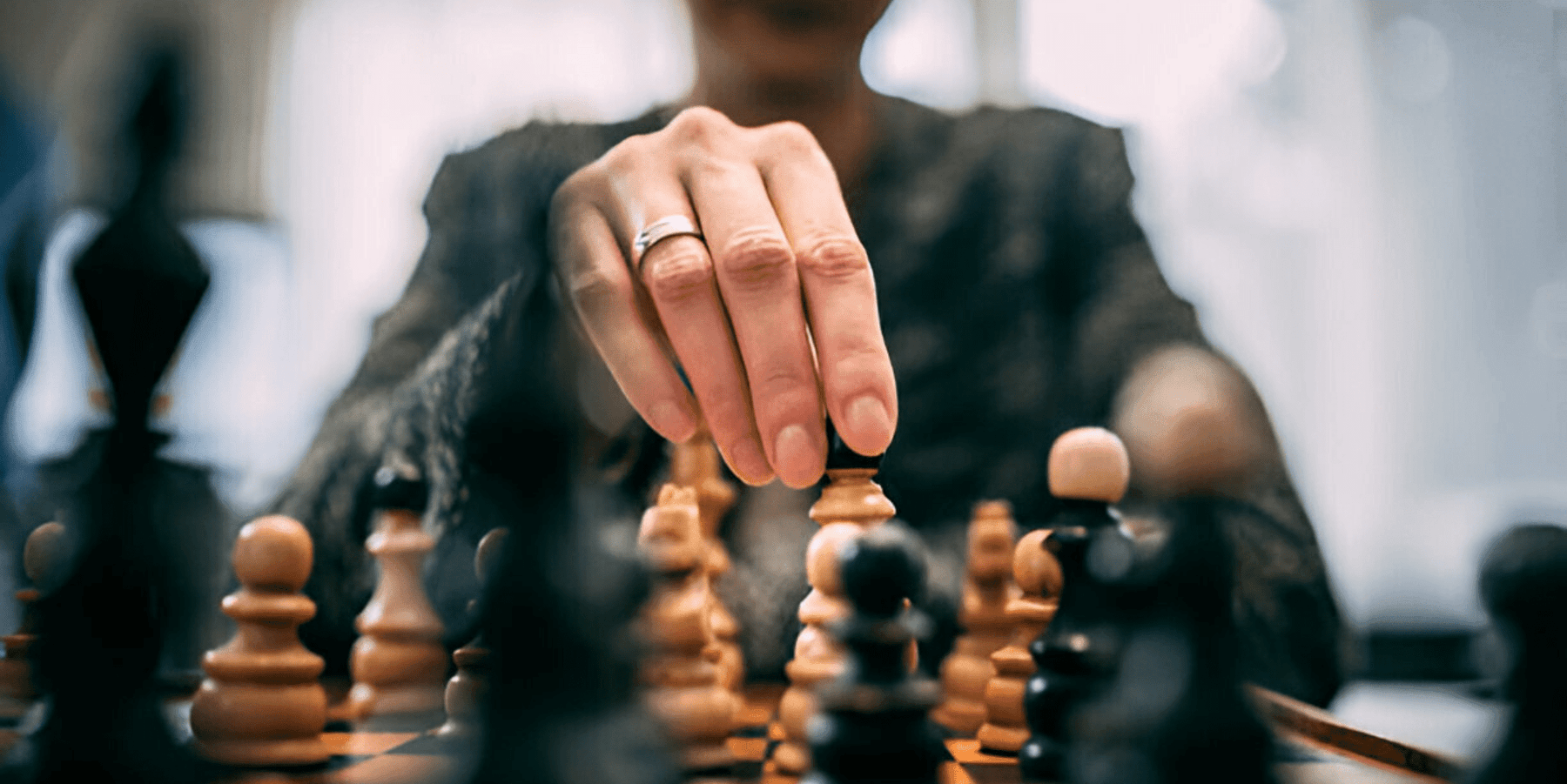
Unleash Your Inner Strategist: The Mental Benefits of Playing Chess
Introduction to Chess as a Mental Exercise

Chess isn’t merely a game; it’s a powerful mental exercise that has been beguiling strategists and thinkers for centuries. At its core, a set of wooden chess pieces, often meticulously crafted, each holding a value and potential that exceed its physical stature on the chessboard. Art and intellect intertwine, making chess not just a pastime but a platform for mental gymnastics. Picture a set of large wooden chess pieces—these luxury chess items are not just for adornment; they serve as soldiers in an intricate battle of minds.
When gifted, especially as a gift for dad or a beloved mentor, these beautiful chess pieces become tokens of appreciation for the mental sharpening and strategic teachings the game imparts. The chessboard becomes a canvas, where every move paints a stroke in the grand tableau of positional play, tactical battles, and long-term strategic plans.
Each session of chess stimulates cognitive abilities, encouraging players to engage in critical thinking, foresee the consequences of their actions, and construct elaborate strategies. One does not have to be a grandmaster to reap the mental benefits; players at any level can nourish their minds through the challenges presented in each game. It is akin to a workout for the brain, making it a prime candidate for those looking to enhance their mental faculties.
Diving into the realm of chess means sharpening problem-solving skills, improving memory, and honing the ability to think several steps ahead. This ancient game, steeped in tradition and intellectual prowess, is an unparalleled tool in the quest to keep one’s mental acuity in peak condition.
The Historical Significance of Chess on Cognitive Development

Chess, a game rooted in antiquity, has long served as a tool for cognitive enhancement. Its inception dates back nearly 1500 years, and through epochs of cultural evolution, it has remained a testament to strategic thinking and mental prowess. The act of manipulating a set of wooden chess pieces artfully arrayed on a checkered board has, historically, been more than mere recreation; it represents a mentally demanding exercise that sharpens logic, foresight, and critical analysis.
Historically, chess served as an educational tool among the nobility, with a set of large wooden chess pieces symbolizing the key players within a kingdom’s hierarchy. Its widespread appeal led to its integration into educational practices. Scholars often emphasized the direct correlation between skill in chess and heightened levels of cognitive operation. This correlation suggested that continuous engagement with the game could foster a more agile and strategic mind.
The luxury chess pieces and beautiful chess pieces we admire today are reminiscent of chess’s historical prestige. They serve not only as a gift for dad but also as a sophisticated intellectual symbol. Engagement with the game has been linked to improved memory capacity, problem-solving skills, and even the potential delay of degenerative neurological disorders like dementia and Alzheimer’s disease.
During the Middle Ages, chess was sometimes referred to as the “King’s Game,” underlining its association with leadership and tactical acumen required for governance. Educational systems across various cultures have adopted chess as a cognitive developmental aid, embedding strategic thinking, patience, and planning into the fabric of learning.
In the spectrum of historical significance, chess’s role in the development of cognitive skills has been both apparent and subtly interwoven into the narrative of intellectual growth. From being a game of elite strategy to a universally accessible pastime, chess continues to be a catalyst for cerebral advancement and an evergreen emblem of mental agility.
Strategic Thinking: How Chess Enhances Your Planning Skills

Chess is not merely a game; it’s a cerebral battlefield where strategic thinking separates the novices from the masters. The game, particularly when played with a set of wooden chess pieces art 809125 or beautiful chess pieces, becomes a striking metaphor for real-life planning and decision-making.
Strategic thinking in chess involves foresight and the ability to envision the future implications of each move. This translates directly into enhanced planning abilities in a player’s personal and professional life. Playing with a set of large wooden chess pieces or luxury chess pieces, for instance, can provide a tactical sensation that magnifies the significance of each decision. The tangible experience of moving these pieces across the board acts as a constant reminder of the importance of approaching life with a strategy in mind.
One of the pivotal aspects of translating chess skills into real-world applications is the requirement to think several moves ahead. Players learn to anticipate opponent’s moves and develop contingency plans. This parallels to being prepared for various outcomes in business or personal projects. Additionally, playing chess is analogous to handling complex projects that necessitate meticulous organization and long-term planning.
Moreover, chess rewards patience and persistence – qualities essential for strategic planners. Making a hasty move in chess can lead to a quick defeat, just as impulsive decisions in life can have undesirable outcomes. Playing chess, especially when it’s a gift for dad or a shared activity within the family, can instil the value of measured and perceptive decision-making.
Incorporating chess into one’s routine catalyzes an improvement in cognitive function related to planning and foresight. Although rarely straightforward, the mental pathways carved by playing chess create a framework for players to navigate the labyrinth of everyday strategy with agility and precision. Thus, chess serves as a foundational tool in the arsenal of anyone looking to enhance their planning skills and strategic thinking.
Memory Improvement Through Chess: Techniques and Examples

Chess is often likened to an art form, where the pieces on the board are carved into a set of wooden chess pieces art 809125, each move a testament to strategy and foresight. For players seeking to enhance their mental acuity, chess delivers especially in the realms of memory improvement. One’s ability to recall previous games, anticipate opponent moves, and remember intricate strategies becomes sharper over time. Chess demands the memorization of different opening sequences, which can greatly improve cognitive function over time.
Here are specific techniques and examples of how chess can bolster memory:
-
Visualization and Recall Practice: Chess players improve memory by visualizing the board and pieces—a set of large wooden chess pieces, luxury chess pieces, or even just mentally conceptualized figures—and recalling moves without physically making them.
-
Chunking: In chess, players often break down complex information into chunks. For example, rather than remembering an entire game move by move, they may remember sequences and positions as whole concepts or ‘chunks’, thereby easing the cognitive load.
-
Pattern Recognition: Over time, players recognize patterns in their games, improving memory through repetition. For instance, the scholar’s mate, a four-move checkmate pattern, once learned, is rarely forgotten.
-
Endgame Study: By practicing common endgames, such as King and Pawn against King, players commit these scenarios to long-term memory. Akin to receiving a beautiful chess piece, each learned endgame is a valuable mental asset.
-
Spaced Repetition: Chess players commonly use spaced repetition, reviewing openings, tactics, and endgames over increasing intervals to enhance retention.
-
Active Learning and Teaching: Players often remember concepts better when they explain them to others. Gifting knowledge, like offering a chess set as a gift for dad, can solidify memory for both the teacher and pupil.
Incorporating these techniques into regular chess practice can transform each match into a rich exercise for cognitive enhancement, particularly memory improvement, turning every player into not just a strategist but also a custodian of mental prowess.
Problem-Solving Proficiency Boosted by Chess Dynamics

The intricate nature of chess, a game often synonymous with strategy and intelligence, has profound effects on one’s problem-solving skills. With each game, players confront an array of complex scenarios, most requiring immediate, calculated responses. As players navigate through various challenges, their problem-solving abilities are honed to a fine edge.
Engaging with a set of wooden chess pieces art 809125, players must anticipate an opponent’s moves, weigh the risks and rewards of their own strategies, and make decisions that have both immediate and far-reaching implications. The game’s constantly changing environment encourages players to adapt quickly and think on their feet, skills that are crucial to effective problem-solving.
The integration of chess dynamics into regular cognitive routines can yield significant improvements in an individual’s ability to dissect and address complex issues. Acquiring a set of large wooden chess pieces not only elevates the aesthetic enjoyment of the game but also serves as an instrument that enhances cognitive function through tactile stimulation and spatial awareness.
Owning luxury chess pieces, especially those gifted say for a dad with a penchant for cerebral pastimes, can promote a more frequent engagement with the game. Regular practice with beautiful chess pieces can help cement problem-solving as a natural and continuous mental activity.
Moreover, the beauty and majesty of the game, represented by finely crafted chess pieces, may inspire a greater dedication to the art of chess, and by extension, an increased proficiency in problem-solving tactics. The symbolic and literal weight of each maneuver echoes the gravity of decision-making processes in real-world scenarios, therefore playing with such beautiful and significant game elements reinforces the skills needed to tackle challenges both on and off the board.
Chess and Emotional Intelligence: Navigating Complex Emotional Terrain

Engaging in a game of chess calls for more than strategic aptitude and a mastery of tactics. It also demands a high level of emotional intelligence. The ability to manage personal emotions and recognize those of an opponent is crucial when sitting across from a set of wooden chess pieces, artfully crafted and poised for battle.
Players must channel their emotions to maintain focus, persist through challenging situations, and avoid becoming flustered by an opponent’s maneuvers. Emotional intelligence plays a vital role in decision-making processes. Each move on the chessboard is a chance for a player to demonstrate patience, resilience, and adaptability – qualities that define emotional maturity.
Beyond the individual, chess promotes an understanding of others’ emotions. A player must be perceptive of an opponent’s body language, patterns of play, and potential psychological strategies. Whether it’s a set of large wooden chess pieces or luxury chess pieces that line the board, the game becomes a mirror reflecting the emotional dynamics between the competitors.
In particular, emotional intelligence in chess:
- Aids in coping with pressure and handling losses with grace.
- Helps identify and exploit an opponent’s emotions to gain a strategic edge.
- Cultivates the ability to anticipate an opponent’s moves by understanding their emotional state.
- Encourages the practice of mindfulness, enhancing a player’s control over their impulses.
For those gifting beautiful chess pieces, perhaps as a gift for a dad who enjoys the game, they’re providing not just a physical token but an instrument for emotional and intellectual development. As these players navigate the intricate emotional terrain of chess, they simultaneously enrich their ability to understand and manage emotions in everyday life.
Pattern Recognition and Tactical Awareness in Chess

Engaging with the intricate world of chess, which often includes a set of large wooden chess pieces elegantly crafted for the player’s tactical pleasure, can greatly enhance one’s pattern recognition skills. The strategic game, regarded as an exercise for the mind, involves numerous patterns that are essential for successful play. These include recognizing the positioning of pieces that lead to various tactical motifs such as pins, skewers, and forks.
In chess, tactical awareness is the ability to see immediate moves that can improve a player’s position or lead to more substantial advantages like winning material or checkmating the opponent. By consistently interacting with beautiful chess pieces on the board—a gift for dad, a mentor, or oneself—players learn to foresee the potential risks and rewards of their moves.
The significance of pattern recognition and tactical awareness becomes paramount in the heat of the game, where a well-timed tactic can mean the difference between victory and defeat. Chess aficionados develop a mental library of patterns through practice and study, which allows them to recognize opportunities and threats swiftly.
Here are examples of how chess enhances these mental attributes:
-
Visualizing patterns: As players move their luxury chess pieces across the board, they learn to identify formations that have the potential to evolve into advantageous positions.
-
Assessing risk: Players become adept at evaluating the consequences of their moves, understanding that each action can lead to a series of predictable responses.
-
Calculating outcomes: The exercise of considering future possibilities helps players anticipate their opponent’s moves, a skill that translates well into real-world problem-solving.
-
Decision-making under pressure: Given the time constraints in chess matches, players enhance their ability to make precise decisions quickly, a trait that can serve them well in high-pressure environments.
Overall, the repeated exposure to complex chess scenarios using a set of wooden chess pieces, art 809125, or any meticulously designed set, sharpens the mind, providing players with a mental edge in pattern recognition and tactical foresight.
Concentration and Focus: The Impact of Chess on Attention Span

Chess is not merely a game; it’s a rigorous exercise for the mind that calls for unwavering concentration and focus. Engaging with a set of wooden chess pieces on the 64-square board can significantly impact an individual’s attention span, enhancing the ability to sustain attention over extended periods.
The intricate nature of chess, with its large wooden chess pieces poised for battle, demands that players remain mentally vigilant and observant of both their own strategies and those of their opponents. As players immerse themselves in the complexities of the game, they inadvertently train their brains to filter out distractions, fostering a heightened level of focus.
Luxury chess pieces become not just beautiful chess pieces, but tools through which players sharpen their cognitive abilities. During a game of chess, the mind must juggle multiple tasks simultaneously - from formulating tactics to predicting opponents’ moves. This multitasking enhances cognitive flexibility and keeps the attention muscles active and engaged.
Furthermore, the practice of contemplating the consequences of each move instills a sense of patience and deliberation, which is crucial for extending the attention span. Players learn to allocate their cognitive resources effectively, resisting the urge to make hasty decisions and instead, taking the time to scrutinize each possibility.
Chess can also be a perfect gift for dad or anyone looking to improve their mental acuity. Not only does it serve as a challenging and entertaining pastime, but it also acts as a cognitive enhancer, especially in the realms of focus and attention span.
In conclusion, the disciplined practice of playing chess, with its aesthetic and functional set of wooden chess pieces, has a profound impact on concentrating abilities and attention span, reaffirming its status as an excellent mental conditioning tool.
Learning from Defeat: Resilience and Growth Mindset in Chess Players

One of the profound mental benefits of playing chess is the opportunity to develop resilience and a growth mindset, invaluable traits that can translate into various aspects of life. Chess players, from those maneuvering a set of wooden chess pieces (art 809125) to those strategizing with a set of large wooden chess pieces, understand that setbacks are part of the learning process.
When it comes to resilience, chess players often experience defeat despite their best efforts. The nature of the game, with its infinite possibilities, ensures that even the most skilled players will face losses. However, the critical lesson lies not in the defeat itself but in the response to it. Successful chess players view their losses as chances to analyze their play, identify weaknesses, and plan improvements. This resilient approach allows players to bounce back from shortcomings with increased knowledge and a fortified strategy.
A growth mindset is a belief that one’s abilities and intelligence can be developed through dedication and hard work. In the realm of chess, this mindset is essential. Players who embrace a growth mindset will:
- See challenges as opportunities to enhance their skills.
- Understand the value of effort and persistence over raw talent.
- Accept constructive feedback and incorporate it into their practice.
- Learn from opponents, including those who may wield luxury chess pieces or display beautiful chess pieces with confidence and skill.
This adaptive perspective transforms potential discouragement into motivational fuel, pushing players to consistently refine their strategies. Indeed, the mental fortitude gained through chess can be a gift for dad, mom, or any individual eager to embrace life’s complex challenges with a strategic mind and resilient spirit.
The Correlation Between Chess and Academic Performance

Engaging regularly in a game of chess is often equated with sharpening one’s mental faculties. This claim is particularly relevant when discussing academic performance among students who indulge in this strategic sport. Proficiency in chess necessitates a thorough understanding of strategy, problem-solving, and decision-making, all of which are competencies pertinent to academic success.
A series of studies have illustrated that students who play chess demonstrate improved mathematical problem-solving skills. The intricate tactics and calculations required to maneuver a set of wooden chess pieces artfully on the 809125-rank-and-file board, closely mimic mathematical operations, fostering a student’s numerical acuity. Additionally, the strategic contemplation exercised in chess helps to bolster spatial reasoning capabilities, a critical factor in fields such as engineering and architecture.
Students who partake in this cerebral sport often exhibit enhancements in their reading and comprehension skills as well. Chess provides a unique way for learners to engage their analytical minds, allowing them to deconstruct complex narratives and derive meanings akin to dissecting intricate literature.
More profoundly, chess has been shown to underpin overall cognitive growth, leading to a general improvement in the education realm. Beyond the immediate parallels to mathematics and reading, the order and discipline ingrained through playing with luxury chess pieces or a set of large wooden chess pieces translate into a structured approach to academic endeavors. Children and adults alike, who receive beautiful chess pieces as a gift for dad or for personal use, find moments of learning transferable to their scholarly pursuits.
The correlation is clear; chess is more than a game—it’s a cognitive development tool that can lead to higher academic achievement. However, it’s important to acknowledge that such findings do not completely dismiss the impact of other factors on academic performance. Chess should be seen as one part of a robust educational ecosystem, supporting and enhancing traditional learning methods.
Social Benefits: How Chess Fosters Communication and Connection
Chess, often considered the game of kings, transcends mere intellectual pursuit. It promotes profound social engagement, proffering benefits that echo well beyond the chessboard. Engaging with a set of wooden chess pieces, art 809125 on the checkered canvas, encourages players from diverse backgrounds to communicate, building friendships and mutual respect.
For those who appreciate tactile sensations, a set of large wooden chess pieces feels substantial and exquisite, fostering a sense of shared luxury and aesthetic appreciation. Similarly, luxury chess pieces serve as not only tools of the game but also as conversation starters, bridging gaps between aficionados and novices alike, creating dialogue teeming with passion and knowledge exchange.
-
Inclusivity and Equality: Chess disregards age, gender, social status, and language, uniting individuals in a common pursuit. Around a chessboard, all players are equal, each move a form of nonverbal communication that conveys complex thought and strategy to the opponent, often resulting in a mutual understanding and a form of connection that transcends words.
-
Community Building: Chess clubs and tournaments are fertile grounds for forging long-lasting relationships. These gatherings serve as networks where individuals rally around their love for the game, cultivating a community spirit and a sense of belonging.
-
Empathy and Understanding: Chess mirrors the diversities of life, teaching players to anticipate and understand the perspectives of their opponents. This breeds empathy, as individuals are encouraged to think from another’s point of view.
-
Gift-sharing and Memorabilia: A beautiful chess set often becomes a cherished gift for dad, friends, or loved ones, symbolizing the bond between giver and receiver. Sharing a game of chess can be a personalized way to connect on birthdays, holidays, or special occasions, adding emotional value to the interaction.
Ultimately, the strategic game of chess provides a conduit for meaningful human connection, fostering environments where communication thrives in the silence of thought and the clamor of competition. It is a social tool that, when wielded with respect and openness, has the power to bring people together in a testament to shared intellect and the universal human desire for connection.
Practical Tips to Integrate Chess into Your Daily Routine for Mental Fitness

Incorporating chess into one’s daily routine can carve out a pathway to enhanced mental dexterity. Individuals pondering about how to seamlessly blend this strategic game with their lifestyle should consider the elegance and allure a set of wooden chess pieces art 809125 brings to any given space. Here’s a step-by-step guide:
-
Set a Regular Time for Practice: Like any other exercise, consistency matters. Dedicate a specific time of day for chess. Early mornings or evenings can be ideal for a quiet, undisturbed game.
-
Utilize Technology to Your Advantage: With a plethora of apps and online platforms, one can play chess virtually anywhere. Sneak in a quick game during lunch breaks or while commuting.
-
Incorporate Chess Puzzles: Not enough time for a full game? Try solving chess puzzles daily to sharpen your tactical skills without the time commitment of an entire match.
-
Make It Social: Include friends or family in your routine. A set of large wooden chess pieces serves not only as a brain booster but also as a centerpiece for social gatherings, doubling as a beautiful chess piece.
-
Invest in Luxury Chess Pieces: For those who truly want to embed chess into their life, splurging on luxury chess pieces can elevate the experience. Beautiful chess pieces can serve as a gift for dad or any loved one, promoting the game as a shared interest.
-
Visualize Moves Throughout the Day: When away from the board, mentally visualize moves and strategies. This continual engagement exercises the brain even when not physically playing.
-
Use as Decor: A strategically placed chess board can serve as a visual cue and inspiration. Every time you pass by, it invites a moment of practice or contemplation.
By intertwining the cerebral sport of chess within the daily fabric of life, individuals can steep their minds in strategic thought, fostering an environment where mental fitness is not just an aspiration but a living, breathing reality.
AI and Chess: How Technological Advances Are Shaping Modern Chess Strategies

The integration of artificial intelligence (AI) into the realm of chess has revolutionized the game, pushing the boundaries of strategic play. AI-powered chess engines, capable of calculating millions of positions per second, provide unparalleled insights into the intricacies of the game. Players now refine strategies by analyzing games through the lens of AI, dissecting move-by-move suggestions to enhance their tactical acumen.
- Accessibility to high-level analytics allows players of all ranks to benefit from AI advancements.
- Contemporary chess software tools aid in identifying weaknesses in players’ games, fostering continuous improvement.
- AI-generated databases are replete with game patterns and positions, creating an expansive knowledge base.
With AI assistance, novices and professionals alike can explore the depth of the game more profoundly than ever before. The study of AI-chess interaction has even led to novel opening variations and unforeseen mid-game tactics that continually redefine competitive chess standards. The digital companionship of AI equips players with strategic insights that were once exclusive to grandmasters.
AI’s influence extends beyond individual training. It contributes to the specter of beautifully crafted luxury chess sets, like a set of large wooden chess pieces or artful representations, such as a set of wooden chess pieces art 809125. These tactile tools combined with AI analysis can elevate the learning experience, striking a balance between the tactile pleasure of moving grand wooden pieces and the cognitive challenge.
- High-caliber AI software has become a coveted chess companion and an exceptional gift for dad, who may appreciate the confluence of traditional gaming with cutting-edge technology.
- The aesthetic pleasure of engaging with luxury chess pieces is only enhanced by the rich strategic layers AI interweaves into the learning process.
As the paradigm of chess evolves with technological progress, the mental benefits of chess are amplified. Modern chess strategies, influenced heavily by AI, teach players to think critically, react creatively, and visualize outcomes - skills transferrable to various aspects of life. The chess board has become a battleground not just of minds but also of man vs. machine wisdom, with human intellect gleaning insights from the digital sage.
Conclusion: Embracing Chess for Long-Term Cognitive Benefits and Life Skills
Incorporating the game of chess into one’s life is no mere pastime—it is an investment in cognitive resilience and personal development. Throughout the strategic battlegrounds offered by a set of wooden chess pieces art 809125, individuals sharpen their minds, deploying critical thinking and foresight. Harnessing the tactical depth of large wooden chess pieces, players are not just engaging in a game, but also nurturing life skills that translate beyond the board.
Embracing chess imbues enthusiasts with patience and the capacity for deep analysis, where every move unfolds layers of complexity akin to life’s own unpredictable nature. By maneuvering luxury chess pieces across the board, the subtleties of problem-solving are illuminated, revealing that each challenge, much like each chess match, is unique and demands innovative strategies.
The benefits extend to emotional intelligence as well; remaining composed under pressure, gauging an opponent’s intentions, and learning from defeat. Chess is a gift for dad, mentor, friend, or child, not just in its physical form but in the lessons it imparts—strategy, humility, perseverance, and adaptability.
Moreover, the empirical evidence is robust, highlighting how regular chess interaction enhances memory, heightens attention to detail, and fosters a growth mindset. In a world where multitasking and constant distraction are the norm, chess posits a beautiful paradox—a singular focus that enriches all aspects of cognition and character.
In summary, to embrace chess is to embrace a lifetime of mental agility and strategic wisdom. Beautiful chess pieces become the conduits of timeless virtues that fortify the mind’s architecture and enable successfully navigating life’s myriad challenges.






